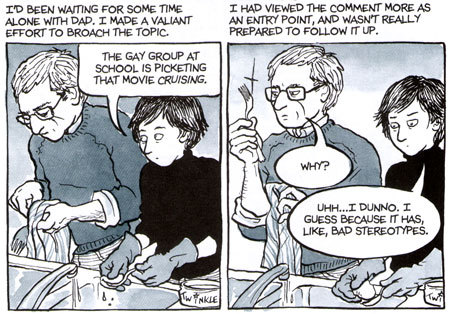One topic which is yet to be fully discussed is that of “Fun Home”. Not the graphic memoir, of course, for that has been the basis of all of our discussion! But rather, the title of this memoir and its possible significance.
Just as every page in Bechdel’s memoir is full of tragicomic wit, so too does her title concisely and brilliantly capture her desired message. Like much of Shakespeare’s writing, the title “Fun Home” can have many different meanings. ("Click here" to see some ingenious examples of double entendre in Shakespeare.) It can be interpreted to be a short form for FUNeral home, where her father worked. (I had not made this connection myself; one day, weeks after beginning the project, my dad pointed it out to me!) It can also be referring to the “home” in which she grew up, which was anything but “fun”. This sets the sarcastic overtone of the entire novel, with two simple words! It also eludes to a Fun House, which is an obstacle course or maze found at carnivals, full of distorting mirrors and misleading paths. As if in a fun house, Bechdel’s reflection did not match who she felt she was on the inside, and her father put a misleading mask on the life he lead. Also like Shakespeare’s text, Bechdel undoubtedly intended for her title to have so many interpretations. The title “Fun Home” is just a little hors d’oeuvre before the “great feast of languages” (and graphics!) that lies ahead for the reader!

![[Red cross icon]](http://bechdeltest.com/static/nowomen.png) Fewer than two women in this movie
Fewer than two women in this movie![[Mute icon]](http://bechdeltest.com/static/notalk.png) There are two or more women in this movie, but they don't talk to each other
There are two or more women in this movie, but they don't talk to each other![[Ties icon]](http://bechdeltest.com/static/men.png) There are two or more women in this movie, but they only talk to each other about a man
There are two or more women in this movie, but they only talk to each other about a man![[Smiley icon]](http://bechdeltest.com/static/ok.png) There are two or more women in this movie and they talk to each other about something other than a man*
There are two or more women in this movie and they talk to each other about something other than a man*![[Talk bubble icon]](http://bechdeltest.com/static/comments.png) There is a comment for this movie
There is a comment for this movie![[Article icon]](http://bechdeltest.com/static/reviews.png) There are links to reviews available for this movie
There are links to reviews available for this movie![[OK-disagree]](http://bechdeltest.com/static/ok-disagree.png) ), someone who has left a comment doesn't agree with the rating (and hopefully explains why).
), someone who has left a comment doesn't agree with the rating (and hopefully explains why).





